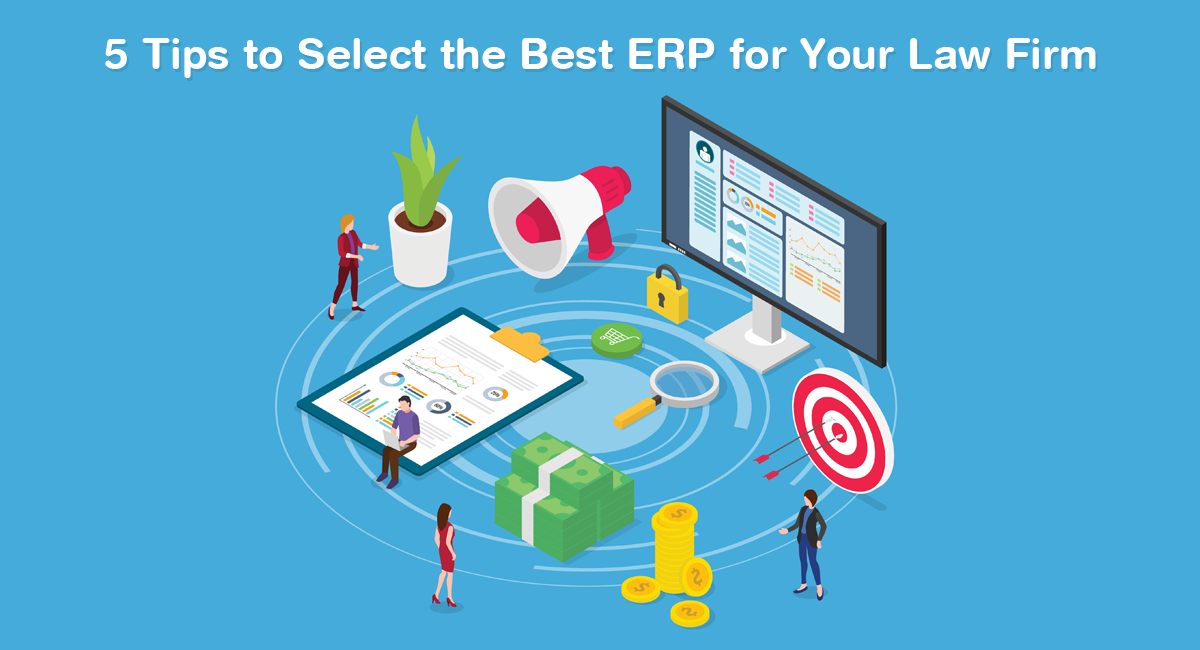

These days the term ERP has been into the trend. Post-COVID scenario for functioning the business has changed drastically. Technology has appeared a must-have thing for business continuity.
There were times ERP systems were thought to be useful just for few sectors only. But now people have understood the importance of technology for the business, and it has increased the technology needs in all the businesses.
Before going deeper into our primary subject for this topic ‘How to choose the ERP system for your law firm’ let’s understand first:
What is an ERP, exactly?
Enterprise Resource Planning (ERP) is a type of business management software—typically a set of integrated applications—that allows any law firm to manage day-to-day business activities such as Client, Matter, Timesheet, Invoices, Expenses, Documents, HRMS, Analytics and etc.
The next question which strikes the mind is:
How does an ERP benefit legal firms?
On a high level an ERP System can help any law firm in the following aspects:
- Bringing the Process
- Boost Productivity
- Increased Collaboration
- Growth
The additional benefits law firms achieve with implementing an ERP are as follows:
- Making the law firm cost-effective
- Removing the requirement for users to be trained on several systems.
- Providing centralized database
- Assisting employees to make better use of their time
- Better compliance and risk management
- Analytics-based decision making
- Improved customer satisfaction
So now that we understand what an ERP is and how it may help your law firm.
Choosing the best software for your law firm is a big decision that necessitates a significant investment. To assist you in making this decision, we’ve compiled a list of things to keep in mind throughout your demo to ensure you get the best out of it.
Here are the 5 tips which could help you choose the right solution:
- Requirement Fit
- 1.1 Features
You should be clear with the objective of this implementation in terms of “Must-Have” and “Good to Have” features. Typically these are features law firms look for:Must-Have Good to Have - Client & Matter
- Timesheet
- Expense Tracking
- Invoicing & Receipts
- Task/ Activities
- Access Control
- Reports
- Document Management
- HRMS – Leave Management, Performance Management
- Court Dates Management
- Vendor Management
- 1.2 Integration with Other Systems
If you’ve some systems already in place and you plan for an ERP, you should know whether this ERP could be integrated with your existing systems are not.Following are few common systems ERPs are integrated with:
- Accounting (Tally/ Quick Books etc.)
- Payment Gateway
- Document Management etc.
- 1.3 Implementation Plan
- How long does it take for the implementation?
(Ideal is to implement it phase by phase e.g. Matter and Timesheet first, then Accounts, then other features as per firm’s priority) - Data Migration: If you’ve existing data, what is the format and is it possible to import the same or not?
- How long does it take for the implementation?
- 1.4 Customization/ Enhancements
- Is the customization charged or free and how are the rates?
- If there is any gap in the product, do they consider it for their future releases or not?
- 1.5 Usability/ User Interface
The complex user interface is one of the prominent reasons why technology implementation fails at any organization. The importance of User Interface becomes even more critical in the case of law firms considering lawyers being extremely busy by profession and not that tech-savvy.So make sure the software you’re going to opt for is easy to use.
- 1.1 Features
- Pricing
Many organizations keep the pricing highly confusing. The actual cost of using the software can end up being far more than its price tag. Make use of the software demonstration to discuss various charges. Inquire about additional user fees, present hypothetical scenarios requiring customization, and implement costs. Discuss storage costs, infrastructure requirements, support, and any prospective modifications that may be required such as:
Following are the points you should be clear with regards to the pricing:- Standard charges (One Time or Subscription Based)
- Is the implementation free/ chargeable?
- Is the cost of training included in the price?
- Post-implementation support included or not?
- What are possible payment terms?
- Taxes, is the price inclusive of taxes or not?
- Security
Data is the key. On one side where technology brings lots of convenience and advantages another side, it brings certain concerns as well with regards to the security of your data. So, it’s equally important to understand how secure your data is going to be? Lack of data security can cost a company a lot of money in terms of leaked data and reparation costs.The aspect of security becomes even more critical if it’s a cloud-based product because a big portion of the security is out of your control and in the seller’s hands.
It’s advisable to get a full insight into how the vendor stores and secures data by watching the software demo.
Following are the questions related to security you should know from your vendor:
- Where is your data going to be stored? (Own Servers or the Cloud)
- If it’s a cloud-based system which cloud do they use?
- What kind of encryption is used?
- What’s the backup policy and disaster recovery plans?
- If you plan to discontinue, how do you get your data back and what does the do with your data?
- What kind of security certifications do they’ve?
- Who all has access to your data?
- After Sales Support
The whole investment goes waste if the technology could not be adopted by the firm. Good customer support has an extremely important role in the successful implementation and adoption of any technology system. So, there are certain things you should know in terms of support before you’re finalizing it.These are some of the aspects with regards to support:
- Are you dealing with the resellers or directly with the product companies?
- What kind of support do you offer and the timings?
- How long does it take to address any issues (if encountered)?
- Do they have any help content available? If yes, check if it’s really helpful or just the name’s sake and covers the majority of the areas.
- Do they’ve functional expertise or not?
- Are they going to assign any point of contact for your organization or not?
- Vendor’s Credibility
Since you’re going to hand over your organization’s critical piece of information with an outsider it’s advisable to check the credibility.To ensure this you may enquire the following:
- Get the firm’s profile which includes how old the organization is and the management team?
- Base location and various offices they operate from.
- Existing clients and their references. It’s better to connect with some of the clients and get some feedback.
That’s it! If you do the above, the possibility of the implementation being successful becomes maximum. It’s one-time research and hard work but this ensures you get maximum ROI from this implementation.
Hope you find the information useful.
We’re the Legal Technology experts, we’ll be happy to assist if you’ve any further queries.

Market Research Analyst with a Master’s in Marketing and Analytical Experience.
 English
English French
French German
German